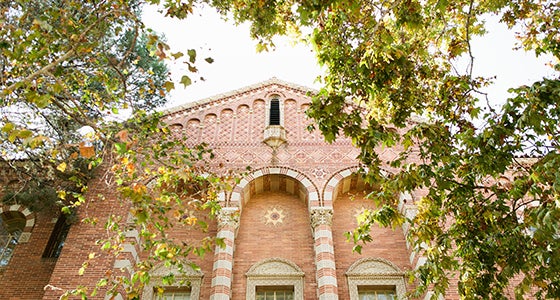Students participating in the UCLA Undergraduate Program in Education and Social Transformation present their research as part of Undergraduate Research Week
“I did not think I’d be doing a research project when I came to UCLA four years ago…. It’s been a really big deal for me,” said Amy Vandyken, an undergraduate student majoring in Political Science and pursuing a minor in Disability Studies and Education. But in late May, Vandyken could be found with students in the UCLA School of Education and Information Studies undergraduate program presenting her research, Universal Design for Learning through Media-based Education. Vandyken’s research explores the potential of the combination of Critical Media Literacy and Universal Design for Learning to further student success. Her work seeks to evaluate the extent to which the two pedagogies have been combined, uncover strategies to facilitate their merger, and revise a number of real world lesson plans using that knowledge.
Vandyken shared her research during UCLA Undergraduate Research Week, a celebration of undergraduate research and creative inquiry taking place May 23 – 27. Vandyken was joined by more than a dozen other undergraduate students who shared their research on education topics in live streamed and pre-recorded presentations as part of the Undergraduate Research & Creativity Showcase.
In education research panel presentations exploring topics ranging from Ethnic-Racial Socialization Among Asian American Families to Spousal Support to Facilitate College Graduation for Latina, Nontraditional, First-Generation College Students, the students talked about the goals of their research, highlighted their methods and strategies, and shared what they had learned.
“It was really amazing to see the work you are doing, you are asking really big and important questions,” Virginia Skylar, a doctoral student in Human Development and Psychology at the UCLA School of Education and Information Studies told the students. “I loved participating and seeing the future of research and the future of education and social transformation.“
Alissa Rocha, an Education and Social Transformation major, presented her research, Aquí se respira lucha: Exploring the role of student-led organizations on Latine student retention. Her study highlights the role student-led organizations play in Latina/o student success and retainment.
“I’ve learned that research can be about anything you want it to be,” said Rocha. “I’m grateful for being able to conduct research on something I am so passionate about and connected to.”
For her project, Rocha incorporated Platicas, a research methodology rooted in Chicana Feminism that uses informal conversations to gain insight and understanding.
“The Platicas allow you to connect with your (research) participant, to connect with them in ways that are more culturally relevant,” Rocha said.
One of the goals of the UCLA major in Education and Social Transformation is to provide students with the skills they need to effect change. Students learn how to interpret social data and research and to critically evaluate research studies, and how to apply these understandings to imagine, assess, and implement solutions to specific problems in education.
The work of Jerikka Thomas, another major in the program, illustrates the progress students in the program are making toward that goal. Continuing research she led in 2021, her study strives to examine first-hand experiences of Black and Brown youth in foster care with different types of community engagement, as well as their perceptions of its effects on their education.
For her project, Thomas sent a survey to youth in foster care through email and social media, and conducted hour-long interviews with four students to discuss details and gain perspective of their experiences with foster care and community engagement. Her presentation explored how mindful community engagement can create long-lasting change for Black and Brown youth in foster care.
“I have a lived experience and want to bring about lasting change,” Thomas said.
Veronica Lopez also explored a research topic close to her heart. A married Latina with children who is pursuing college education as an older student, she explored questions of how first-generation, non-traditional Latina college students benefit from spousal support, and look at how much and what types of support women receive as they continue their academic trajectory.
Her findings showed the least support offered was for what she called “instrumental support,” including taking care of children, cooking, cleaning and other household responsibilities. Fifty percent of respondents indicated they seldom received help in these areas. Financial support varied, with 30 percent saying they always receive help, but 40 percent saying they never do. More than two-thirds (70%) of the women said they receive the emotional support they need.
Lopez said she was somewhat surprised by the importance of the findings regarding emotional support, but she can understand them.
“For me personally, that emotional support, that’s been my experience. My husband, whenever I’m struggling and really stuck in my homework, and say I can’t do this, my husband will say, ‘Don’t worry you will get through this — you always end up doing better than you think.’ Those kinds of words are more important than anything else.”
Lopez says that there is little research that is focused on how Latinx first-generation female graduate students are benefiting from spousal support as they pursue higher education, and she hopes to pursue graduate school to learn more about these students.
“Being a mom, being a wife, taking that part-time job, but still succeeding at school, I’d like to know more about how they are doing and how they are achieving in higher education.
###
A full listing of undergraduate research on education topics presented during the Undergraduate Research and Creativity Showcase can be found at https://my.ucla.edu/conference/urweek2022/105
UCLA Undergraduate Research Week is produced by the Undergraduate Research Center – Humanities, Arts, and Social Sciences and the Undergraduate Research Center – Sciences in collaboration with the UCLA Division of Undergraduate Education, UCLA Library, UCLA Alumni Affairs, the Undergraduate Science Journal, and Aleph: Undergraduate Research Journal for the Humanities and Social Sciences . Nearly 1,400 undergraduate students presented research during the Undergraduate Research & Creativity Showcase.
